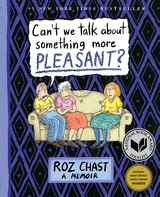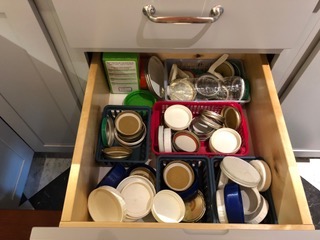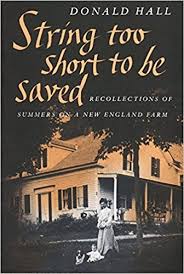 Can’t We Talk About Something More Pleasant is New Yorker cartoonist Roz Chast’s graphic memoir about caring for her elderly parents as they resisted the help that they needed and that their middle-aged daughter was at initially clueless to provide.
Can’t We Talk About Something More Pleasant is New Yorker cartoonist Roz Chast’s graphic memoir about caring for her elderly parents as they resisted the help that they needed and that their middle-aged daughter was at initially clueless to provide.
Providing that care requires some tricky role-reversal, and Chast has a hard time convincing her parents to accept change willingly. But change crashes down on Elizabeth Chast when she falls from a ladder she shouldn’t have been climbing in the first place, and to George, who forgets how to find his way home. It falls to Roz, an only child, first to attempt avoiding the inevitable pitfalls of frail ninety-somethings trying to maintain their independence in a home that’s become unsafe, and then picking up the pieces after the inevitable catastrophes. I know. Been there; done that.
HUMOR
So it was fun – and funny – to read about someone else’s story, especially one told with humor. It’s often hard to laugh as this particular drama takes place. Baby Boomers – spawned by the Greatest Generation – are now trying to figure out how to care for parents who were raised during the Great Depression, came of age during World War Two, and who are now living well into their nineties with sagging bodies and softening minds. Generally, they don’t accept help.
A DRAWER FULL OF JAR LIDS
But there was one particular frame in the book which rankled. Instead of drawing the remarkable clutter that accumulated in a small apartment over a very long period of time, Chast photographed it, providing documentary proof of the colossal mess. One caption read, “Why was there a drawer full of jar lids?” next to a photo of the same.

My drawer of jar lids.
I, too, have a drawer full of lids.
As the New England saying goes, If it ain’t broke, don’t fix it, and if it is broke, don’t throw it out. So some of my lids may – or may not – fit the wide assortment of glass jars in which I store grains and cereals, pickles jams, stones from the river, and coins that come loose in the wash.
STRING TOO SHORT TO BE SAVED
I cleaned out my parents’ houses the three times they downsized and my father’s last home for the last time, last month. I found countless collections of broken pencils, pens that had run out of ink, single socks, and a random collection of greeting cards never sent.
 All this stuff reminds me of Donald Hall’s poignant collection of essays whose title comes from a box full of String Too Short To Be Saved that he found in the attic of his grandparents’ farm after they died.
All this stuff reminds me of Donald Hall’s poignant collection of essays whose title comes from a box full of String Too Short To Be Saved that he found in the attic of his grandparents’ farm after they died.
When I look around my house, I think the jar lids are the least of the stuff I’ve got stashed away in forgotten drawers and boxes, to say nothing of the clutter in the attic and the junk in the basement, both full.
Holding on to things is a drawback to living in place for so long. But when I think about what all this stuff represents to my children if they end up having to clean out this house, I’m motivated to get a head start.
Now that I don’t have any elderly parents to boss around, I best become my own boss and clean up my house.
THE GIFT OF A CLEAR ADVANCE DIRECTIVE
Meanwhile, I am incredibly grateful to my father for the clarity of his Advance Directive and his wishes about dying. You can listen to that story, broadcast on the stations of Vermont Public Radio, here.
While having the conversations about end-of-life issues can be unpleasant, they can also bring clarity and unity around the inevitability of death. If you haven’t had this conversation or written your Advance Directive for Health Care, I highly recommend that you do. And reading Chast’s memoir, Can’t We Talk About Something More Pleasant? is a good way to start talking.
DISCUSS CAN’T WE TALK ABOUT SOMETHING MORE PLEASANT WITH ME
The Rockingham Free Public Library and Brattleboro Area Hospice are sponsoring a book Discussion about Can’t We Talk About Something More Pleasant? by Roz Chast on Monday, September 24 at 5:30 PM. I’ll be facilitating the discussion.
THE DETAILS
The Rockingham Free Public Library, 65 Westminster Street, in Bellows Falls. Books are available on loan at RFPL. The program is free, open to the public, and accessible to people with disabilities. For more information, contact the library at reference@rockinghamlibrary.org or 802/463-4270. Sponsored by the Vermont Humanities Council under a grant from the National Endowment for the Humanities.
Hope to see some of you there – and all of you here again next week. Don’t forget to subscribe to have these essays emailed to you almost every Wednesday.

Very accurate, Deb. Parents resist help until they have to go into the nursing home earlier than they would have had they accepted help. That story comes up over and over again.
Regarding not throwing things out: In my father’s paperwork, I found 27 credit cards. As I sent the paperwork to prove I was the executor to each credit card company, I learned that most had been canceled, but he had saved each card.
Yup. Sounds familiar. ~Thanks for your comment.
Ah, yes! I, like you, Deb, came away from cleaning out my parents’ retirement place with a determination not to make MY kids sort through things like carefully washed and folded pieces of tinfoil and dozens and dozens of cookie tins. Plus — talking of “string too short to be saved” — many, many flimsy plastic grocery bags filled with foot-long hanks of rope (my parents were sailors).
But at the same time, I absorbed from my parents and think/hope I’ve passed on to my kids an appreciation for family treasures. Used tinfoil may not meet that test, but I’m ever so glad that my parents were such neat-freaks that they tossed the love letters they wrote to each other while courting or the ceramic frog my dad made as an 8-year-old, which sits today on my kitchen windowsill.
If disposing of tinfoil, cookie tins, and “rope too short for a sloop” is necessary to ensure that love letters and childhood crafts survive, I’ll take the package deal!
Saved “tin foil” will never look the same! ~Thanks for reading & commenting.
Oops, I just realized that I meant to write in my second paragraph above “…that my parents were NOT such neat-freaks…”!
Having gone through my Mom’s things 3 times and my husband’s things when he passed, I understand what you mean. After my Mom passed away this February, my older sister and I sorted through 100’s of photographs. We came up with the criteria of 1) we had to know who the people were in the picture, 2) no blurry shots, 3) no landscapes or scenery and 4) no multiples of practically the same picture. We kept about 1/10th of what was there. I know now what will happen to my many pictures, some in photo albums clearly marked and many in rubber banded piles with only a note at the top like “Yellowstone 1996” I have started to go through my own pictures now to save my boys the trouble.
Thank you for this absolutely fabulous set of rules for culling photos!
I can’t say how many persons I alerted (encouraged) to the need to discuss with their elderly parents(and themselves, as we are the 60+ group now) the need for advance directives, both medical and financial. I was stunned, as executor of my Mom’s estate, by how much work, settling an estate entailed, and that was after every directive, will, financial accounts, etc. had been carefully documented by Mom before her passing. Only a year after her passing, my secretive in-laws, both wind up in same hospital, within days of each other, are now both in Nursing homes, neither of whom may ever return home again. We had asked for a copy of their will just a month or so prior. When I tracked down the Attorney who prepared their simple cross-wills (due to our inability to interact in any way regarding their care), I asked him ,why there were no directives of any type. He told us they absolutely refused although he sternly warned them of the consequences. You want to know what not having advance directives is all about ? No…you do not want to know. They are living out the agony. One is dying and one in dementia lockdown unit. And just like the book you mentioned, my wife is an only child. If this were a novel it would be a horror novel only “not fictional “.
I’m sorry for everyone involved in this avoidable tragedy. Advance Directives for Health Care are not just for people over 60; they are for every one of legal majority. Everyone eighteen or older should have an Advance Directive and name a health care agent. Not everyone gets to live to old age; younger people get sick and are in terrible accidents all the time. Anyone without an Advance Directive can end up in medical limbo, and anyone who wants all possible measures taken to keep them alive better let those who will make those decisions for them know while they can.